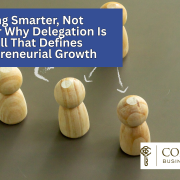Introducing the Concierge Business Solutions® Affiliate Program
A few years ago, something quietly powerful started happening.
People would say, “I sent you someone.” Or, “I shared Essential Elements™ with a colleague.” Almost every time, they’d add, “I hope that was okay.”
It was more than okay. It was everything.
Those referrals didn’t come from marketing funnels or paid ads. They came from real experience. From business owners who had used our tools, implemented our systems, and experienced firsthand what structure and operational clarity can do for a business.
At the same time, behind the scenes at Concierge Business Solutions®, we were doing some of the biggest work in our company’s history. We revamped our software, modernized our platforms, and restructured our programs to meet today’s service business owners where they actually are. We expanded our offerings so owners could start small, grow intentionally, and stop being the bottleneck in their own business.
As everything came together, one truth became clear: people were already helping us grow. We simply weren’t rewarding them for it
That didn’t sit right. Because in our industry, referrals aren’t casual. They’re personal. When you recommend a resource, you’re putting your reputation on the line. You’re saying, “I trust this. I believe in this. This helped me.”
So we built something new. Not to sell harder, but to honor that trust.
That’s how the Concierge Business Solutions® Affiliate Program was born.
Why We Built the CBS Affiliate Program
For years, referrals happened informally. Owners shared Essential Elements™, consulting services, policies and procedures packages, and the 5-Day to Freedom Challenge because they genuinely believed in them. We knew it was time to elevate that experience and make it structured, transparent, and rewarding.
The CBS Affiliate Program was designed to be simple, transparent, and aligned with the values that define our industry. There are no complicated dashboards or tech overwhelm. You always know where your referrals stand. And when your trust leads someone to become a client, you benefit directly.
If you believe in well-run service businesses and the power of systems, this program gives you a natural way to share tools that truly help, while earning for doing so.
How the Affiliate Program Works
 We intentionally designed this to be effortless.
We intentionally designed this to be effortless.
First, you sign up and receive your personalized referral link along with a quick-start guide. Then, you share CBS resources in whatever way feels authentic to you. That might be a direct message, a conversation, a social media post, or an email to someone who needs better systems.
When someone uses your link and becomes a client, you earn a commission. Everything is tracked clearly through our system, so there is no guesswork.
For recurring subscriptions such as Essential Elements™ Plus and Complete, you continue earning as long as your referral remains active. We also offer performance bonuses for affiliates who reach certain milestones throughout the year.
No quotas. No pressure. Just aligned partnership.
What You Can Promote
Affiliates can share any product or service within the CBS ecosystem, depending on what best fits the person they are referring.
That includes Essential Elements™ Software in all tiers, the Freedom by Design™ Self-Study Program, policies and procedures packages, Essential Guides, business consulting, the 5-Day to Freedom Challenge, and various training and coaching resources.
You are never locked into promoting just one offer. You simply connect people with the solution that fits their stage of growth.
Why This Is a True Win-Win
 You already understand what happens when a business gains clarity. When documentation is organized, processes are repeatable, workflows are structured, and the owner steps into the CEO role instead of managing daily chaos, everything changes.
You already understand what happens when a business gains clarity. When documentation is organized, processes are repeatable, workflows are structured, and the owner steps into the CEO role instead of managing daily chaos, everything changes.
By referring CBS resources, you are not selling. You are helping other owners eliminate overwhelm, streamline operations, improve client communication, reclaim time, increase billable hours, and reduce stress.
For many service-based entrepreneurs, this is transformational.
The Affiliate Program ensures that when you facilitate that transformation, you are compensated for the trust and credibility you’ve built. That is what real partnership looks like.
A Powerful Way to Start 2026
The concierge and lifestyle management industry is evolving. There is growing demand for structured, scalable, well-run service businesses. More owners are actively searching for tools that help them scale responsibly without burning out.
The CBS Affiliate Program positions you as a connector and trusted resource in that process. Whether you want to add a passive revenue stream, strengthen your professional network, deepen your industry expertise, or elevate the standards of our profession, this program creates meaningful opportunity.
Read more on our latest newsletter HERE.
Ready to Join?
Becoming an affiliate takes just minutes.
If you’ve supported CBS in the past or believe in the power of systems-driven service businesses, we would love to welcome you into this next chapter.
Sign up HERE.
Let’s make 2026 the year of collaboration, clarity, and collective growth



 The original version of Essential Elements™ assumed a business that could pause long enough to document everything, plan ahead, and build structure before moving forward.
The original version of Essential Elements™ assumed a business that could pause long enough to document everything, plan ahead, and build structure before moving forward. The moment everything changes
The moment everything changes Running a business is hard—I get it. You’re wearing all the hats, juggling endless to-dos, and wondering when you’ll finally have the breathing room you thought entrepreneurship would bring.
Running a business is hard—I get it. You’re wearing all the hats, juggling endless to-dos, and wondering when you’ll finally have the breathing room you thought entrepreneurship would bring.
 This podcast isn’t just about where business owners have been.
This podcast isn’t just about where business owners have been. Subscribing creates space to think about your business instead of just surviving inside it.
Subscribing creates space to think about your business instead of just surviving inside it.
 For decades, growth was the goal.
For decades, growth was the goal. These trends are not separate. They reinforce one another.
These trends are not separate. They reinforce one another.
 There is a common belief that successful entrepreneurs are great multitaskers. In reality, the brain is not built for sustained, complex multitasking.
There is a common belief that successful entrepreneurs are great multitaskers. In reality, the brain is not built for sustained, complex multitasking. Delegation is not a single action. It is a progression.
Delegation is not a single action. It is a progression.
 Imagine hiring someone to work on your home. One worker asks thoughtful questions, seeks to understand your vision, and takes pride in delivering a result you’ll love. Another counts minutes, asks about breaks, and does only what is strictly required.
Imagine hiring someone to work on your home. One worker asks thoughtful questions, seeks to understand your vision, and takes pride in delivering a result you’ll love. Another counts minutes, asks about breaks, and does only what is strictly required. Customer service mentality directly affects revenue.
Customer service mentality directly affects revenue.
 The pace of change has accelerated. Remote and hybrid work models are no longer exceptions — they’re becoming standard. Flexible schedules, digital collaboration, and location-independent teams are reshaping how businesses operate day to day.
The pace of change has accelerated. Remote and hybrid work models are no longer exceptions — they’re becoming standard. Flexible schedules, digital collaboration, and location-independent teams are reshaping how businesses operate day to day. Adding the right technology to a small business isn’t about replacing people — it’s about freeing them.
Adding the right technology to a small business isn’t about replacing people — it’s about freeing them.
 A strong plan begins by defining what success actually looks like.
A strong plan begins by defining what success actually looks like. Technology is no longer something small businesses can afford to ignore. It is often the difference between constant overwhelm and sustainable growth.
Technology is no longer something small businesses can afford to ignore. It is often the difference between constant overwhelm and sustainable growth.
 For years, most small companies have operated with a simple mindset: “We’re not big. We can keep track of things ourselves.” And in the very beginning, that may even be true. When you have only a handful of clients and a predictable schedule, your brain can carry most of the load.
For years, most small companies have operated with a simple mindset: “We’re not big. We can keep track of things ourselves.” And in the very beginning, that may even be true. When you have only a handful of clients and a predictable schedule, your brain can carry most of the load. This was the whole reason we built Essential Elements® — to give concierge, lifestyle, and service-based businesses the operational backbone they’ve never had access to. Not a generic software solution. Not an overbuilt corporate platform. But a workflow system built specifically for the realities of small service businesses: the speed, the personalization, the constant moving parts, and the need for reliability every single day.
This was the whole reason we built Essential Elements® — to give concierge, lifestyle, and service-based businesses the operational backbone they’ve never had access to. Not a generic software solution. Not an overbuilt corporate platform. But a workflow system built specifically for the realities of small service businesses: the speed, the personalization, the constant moving parts, and the need for reliability every single day.
 Referrals are fantastic — they’re the gold star of trust. But depending only on referrals is like eating leftovers every night. It’ll get you by, but you never really know what you’re going to get or when.
Referrals are fantastic — they’re the gold star of trust. But depending only on referrals is like eating leftovers every night. It’ll get you by, but you never really know what you’re going to get or when. Networking isn’t just swapping business cards and hoping something sticks. It’s about building real relationships that turn into referrals, partnerships, and opportunities you’d never find on your own.
Networking isn’t just swapping business cards and hoping something sticks. It’s about building real relationships that turn into referrals, partnerships, and opportunities you’d never find on your own.